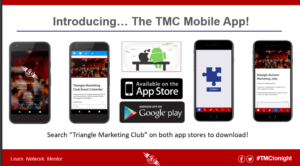On March 27, TMC hosted JP Sherman of Red Hat who spent the evening talking about ways to optimize your on-site search. Currently, JP works as a Search & Findability Manager at the company. He has even created a search engine for video games.
Why does search matter?
First and foremost, a search is a journey that starts internally. When done correctly, it results in the search having more information or knowledge that they started with. You may ask yourself, “why is onsite search so vital?” The answers are as followed:

- The users who use your site search are engaged
- Claim you have something they desire
- Trust you, to a certain extent
- Are actively looking
If these consumers find what they are seeking they:
- Are more likely to visit your site again
- Are more likely to place whatever they are looking at in their cart
- Are more likely to ingest your material

If these consumers do not find what they are searching for they:
- Turn to Google
- Recall the negative results more easily than the positive ones
- Less likely to continue searching on your site
Numbers on internal search
- 30% of visitors use internal search
- 6 times likely to convert if users are utilizing internal search
- 15% of companies delegate tools and resources to improve internal search
The bottom line is this- making internal search begins with establishing a view of the value of your content through titles, metadata, and microdata.
How to measure search behavior

- Query- the search itself
- Acceptance- recognizing the conditions that indicate acceptance
- Rejection- recognizing the conditions that indicate a failure state
Terminations occur when the one doing the search either accepts or rejects the results, based on the internal criteria, impacted by the findings of that search.
Avoiding data overload
Start with keywords. Determine which ones are getting the most engagement. Identify the top converting keywords and their context.
- High Frequency/Low Intention (top of search funnel) – popular but vague keywords
- Low Frequency/High Intention (middle of search funnel) – rare but specific keywords
- Long tail- more than three or four specific terms
- Unicorns- queries that happen once in a given time
Metrics and calculated for the keywords are as followed:
- High Frequency/Low Intention- Clicks- Click through rate
- Low Frequency/High Intention- Conversions- Conversion rate
- Long tail- No clicks- Consumption rate
- Unicorns- Position- Negative click-through rate

CTR
Click through rate in on-site search measures clicks from search engine results page
- Great way to measure the success of your on-site search
- A good CTR for onsite search is > 85%
- These users have high expectations for finding the content they need in part because of Google
SERP failure
- 33% of them re-searched w/o assistance
- 59% of them re-searched with assistance
Failure means you can ask them for more information. Additionally, autosuggest can help users and filter their intentions even when the customers themselves don’t know the right phrase.

Improving search
- Practical Exercises- use popular search terms, localize your internal search, discover the content gaps from a failed search
- Intermediate- measure the time between query to conversion, create conversion events for content, test user interface changes in search engine results page
- Mastery- create search-oriented microdata into content, use personalization to bias results, integrate search data in CMS
Rest assured, if you do not have a search development team, there are applications out there to assist you. Some of them include SearchBox software, Lucidworks, and Coveo.
Besides having great speakers, We also like to have fun which is why we do giveaways. This meeting we gave away tickets from one of our sponsors, LiveNation. Be sure to RSVP to our next meeting where we will be hosting Amy Schmittauer on April 24.
We thank our sponsors for allowing us to serve warm food and cold drinks at all TMC events. Download the TMC app. We have updated the app as of yesterday. The app allows you to connect with others in the room. Next, we will be adding a directory to capture all the names of people you might have interacted with but forget their name.

